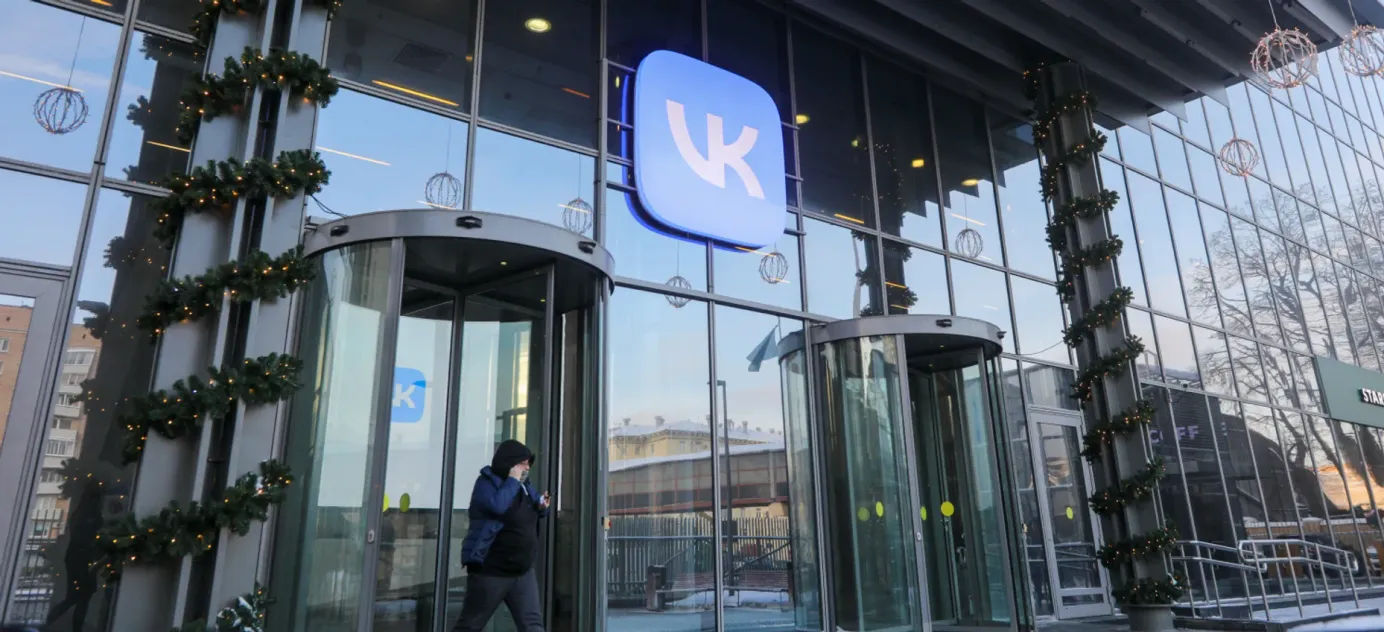
THE BELL WEEKLY: A nepo-baby shuffle at VK
Hello! This week we report on a possible shake-up at one of Russia’s most important tech companies. We also assess the impact of the West’s oil price cap with two of its authors and highlight the latest crackdown on independent journalists, media outlets and their readers.
Russia’s VK could be about to get a new CEO
Vladimir Putin’s inauguration — the official start of his new presidential term — is set for May 7. Talk is swirling that a possible government reshuffle could soon follow. It is not just ministries that are preparing for a leadership change, state-run companies are as well. One of the most widely discussed changes in the tech sector is the possible resignation of Vladimir Kiriyenko — son of Sergei Kiriyenko, the deputy head of the presidential administration and Kremlin’s point man on domestic policy — from his role as CEO of VK Group. His rumored replacement? Another political nepo-baby: Stepan Kovalchuk, the grandson of Mikhail Kovalchuk and great nephew of Yury Kovalchuk, one of Putin’s closest confidantes.
- The resignation of Vladimir Kiriyenko from VK has been actively discussed inside the company in recent months, four sources close to the group and Kiriyenko told The Bell. If he does step down, it is likely to happen after Putin’s inauguration, when the full government resigns (a constitutional obligation), one source said. One of the reasons for his departure could be strained relations between Kiriyenko and Stepan Kovalchuk, currently a top exec in the company. Kovalchuk’s family are major shareholders and the 29-year-old represents their interests inside the firm.
- Kiriyenko could return to state-run Rostelecom, where he served as vice president for five years before joining VK. Alternatively, he could move directly into the government, possibly as a deputy minister with a view to becoming digital development minister in the long-term.
- Stepan Kovalchuk’s grandfather, Mikhail Kovalchuk, is president of the Kurchatov Institute. Mikhail’s brother, Yury Kovalchuk, is the co-owner of Rossiya Bank and one of Putin’s closest friends. He is also a major player in controlling the country’s TV networks and has been tasked by the Kremlin with extending that influence into the online space. His companies bought into VK in 2021 and after that deal, Vladimir Kiriyenko — whose father Sergei is considered close to the Kovalchuks — was appointed CEO.
- Stepan Kovalchuk has worked at VK since the late 2010s, but his career at the company really took off after his family bought a stake. He was appointed senior vice president for media strategy and service development, then became head of a unit that included both the VKontakte and Odnoklassniki social media sites, as well as the politically sensitive news aggregation service (previously owned by Yandex), and VK’s video platform, which in the Kremlin’s eyes should eventually replace YouTube in Russia.
- Relations between the two young execs have not been smooth. One source told The Bell that the pair may even have clashed publicly inside the businesses. Kovalchuk, they said, wants more freedom, but his projects have to date been loss-making.
- In 2022, VK was among the top 10 loss-making companies in Russia, losing 32.6 billion rubles ($350 million). Last year its net loss shrunk, as did its debt. The company has had a number of internal problems in the past — and such issues are likely to become more evident from now on, The Bell’s sources say. However, the Kremlin understands VK’s financial results and its inability to turn a profit, viewing it sympathetically — one source described the Kremlin’s perspective as: “our team is facing problems and it’s hard for them.”
- At the moment, part of Sergei Kiriyenko’s remit in the Kremlin is overseeing domestic tech policy. Whether he will retain this post after Putin’s inauguration is unclear. Meduza reported that the Kremlin is discussing moving him on.
Why the world should care
The situation inside VK is a vivid illustration of how Russian nepotism works, with the management of one of the largest and most important companies in the country being shifted between the offspring of influential elites.
Is the West’s oil price cap working?
In the 18 months since it was introduced, the oil price cap has become one of the more controversial Western sanctions slapped on Russia since it invaded Ukraine. Moscow and its oil clients have found it easy to circumvent the measures and Russia’s Urals blend of crude oil has long been exported above the $60-a-barrel limit. Meanwhile, the Kremlin’s oil revenues have returned towards record levels. The Bell asked two of the cap’s backers — one of the authors of the idea, former Assistant Secretary at the US Treasury Ben Harris, and the current US Assistant Secretary of State for Energy Geoffrey Pyatt — about whether they see the cap as working.
- The oil price cap — which bans Western companies from providing maritime services, including financing, insurance, and shipping for oil sold above a set limit —.was designed to reduce the flow of energy revenues to the Russian budget, while also preventing a jump in global prices due to a hit to supply. The latter goal was largely achieved. In December 2022 when it came into force, benchmark Brent crude was trading at $85 a barrel. It now costs $88. For large periods in between oil has been below the $85 mark.
- In developing measures targeting Russia’s oil sector, the authors of the sanctions were afraid that Russia would stop supplying oil to the world market altogether, Harris told The Bell. In the end they came to the conclusion that Russia’s dependence on its energy exports is too great to risk abandoning the world market to spite the West. That assessment may have turned out to be correct, but the effectiveness of the price cap as a constraint on Russia’s budget revenues is a much more complicated question.
- Both Harris and Pyatt claim that the price cap has worked to reduce Russia’s income. According to US estimates, the Kremlin’s tax take from oil is down 30%. For 2023, Russian data generally supports this claim. According to the finance ministry, income fell 24% when calculated in rubles and almost 40% in US dollars. This year, however, the argument that Russia’s tax income has been hit breaks down. In the first quarter, Russia’s oil and gas revenues were up by 79% — effectively covering last year’s decline.
- But Harris makes another point about the financial hit. To circumvent the price cap, Russia is spending a lot of money, wasting funds that would otherwise be going to the war, he said. However, others see the direct costs of getting round the price cap through Russia’s “shadow fleet” of tankers as actually relatively low compared to the sums being brought in. According to one estimate, it costs Russia around $8.5 billion — or just a quarter of the Kremlin’s tax revenues for the first three months of this year. Harris told The Bell that the US Treasury estimates the cost to be higher, and secondly, that even that figure is a significant sum that could otherwise have been spent on tanks and artillery.
- One of Harris’ main arguments that the cap is working, however, comes down to the higher costs of trade. He estimates Russia is forced to pay an extra $10 on every exported barrel due to the loss of old trade routes. Tankers are no longer hopping across to northern Europe, instead having to voyage to the likes of India. Russia’s main buyers used to be four days away, now they are 30 or more, he said. While it is hard to dispute that, it is also fair to say this has nothing to do with the oil price cap. Russia is being forced to sell oil to far-flung countries because of the EU’s own ban on Russian oil imports, not the price cap.
- Where next in the West’s oil sanctions? The US and EU are determined to fight Russia’s shadow fleet which makes it possible for Moscow to get round the $60-a-barrel limit. The shadow tankers are expected to be the main target for new rounds of EU sanctions and new restrictions by the US — some tankers are already being targeted — will become a more regular feature of new sanctions announcements by Washington.
Why the world should care
The price cap has not proved to be the most effective constraint on Russia’s budget revenues. But US officials and politicians also understand the scale of the task they set for themselves. It is not easy to wipe out the energy revenues of the world’s second largest oil exporter without causing havoc in the global oil markets.
A new wave of repression on media outlets — and their readers
As was widely expected, Russia’s security forces have started cracking down on the Kremlin’s perceived opponents and enemies with renewed vigor following the presidential election. In the span of just a few days, three journalists from well-known Russian and international media outlets — Forbes Russia, Reuters and the Associated Press — were detained. At the same time, readers have been fined for quoting independent media organizations that have been labeled “undesirable” — repeat offenders can be jailed.
- Russia has arrested three journalists since last Friday. Forbes Russia journalist Sergei Mingazov was arrested in the Far Eastern city of Khabarovsk on charges of spreading false information about the Russian armed forces — punishable by up to 10 years in prison. He was accused of reposting a message in his personal Telegram channel about Russian soldiers massacring civilians in the Ukrainian town of Bucha in 2022.
- Over the weekend, two more cases emerged about the arrest of Russian video journalists who had worked with foreign media outlets — producer Konstantin Gabov, who had worked with Reuters, and cameraman Sergei Karelin, who worked with the Associated Press, and previously with Deutsche Welle. Both are accused of participating in an extremist organization — specifically, shooting videos for the YouTube channel of Alexei Navalny’s banned Anti-Corruption Foundation. The offense carries a possible six-year prison sentence.
- Both Gabov and Karelin are Russian citizens (though Karelin also has an Israeli passport), so it is unlikely the pair will be added to the “fund” of those being arrested in order to negotiate exchanges for Russians imprisoned abroad. Instead, we can assume that the authorities are rounding up all journalists they see as linked to Navalny. In March, SotaVision video journalist Antonina Favorskaya was arrested on similar charges.
- The Russian authorities are also tightening the screws against readers of independent media outlets that have been labeled “undesirable.” The designation is a level up from the “foreign agent” badge and criminalizes people not only for working with organizations but also for “participating” with them in any way — including quoting or reposting articles.
- Mediazona analyzed court rulings related to breaches of the “undesirable” law and found that in 2024 the number of cases related to independent media outlets surpassed that of religious organizations for the first time. So far this year courts have issued 19 rulings against people found guilty of participating with “undesirable” media organizations — 12 of them concern Meduza. The most frequent cases were prosecutions of people for reposting articles, but they also targeted employees and sources.
- Initial prosecutions for breaching the law results in a fine of between 5,000-15,000 rubles ($50-150). However, those found guilty of two breaches in a year can be sentenced to prison for four years.
Why the world should care
Dozens of media outlets have been named “foreign agents”, but only a few are “undesirable” at the moment. The next step in the Kremlin’s crackdown on independent journalism is to name any outlet it doesn’t like as “undesirable,” effectively criminalizing the dissemination of their articles in Russia and the sharing of them by anybody inside the country.




